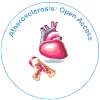当社グループは 3,000 以上の世界的なカンファレンスシリーズ 米国、ヨーロッパ、世界中で毎年イベントが開催されます。 1,000 のより科学的な学会からの支援を受けたアジア および 700 以上の オープン アクセスを発行ジャーナルには 50,000 人以上の著名人が掲載されており、科学者が編集委員として名高い
。オープンアクセスジャーナルはより多くの読者と引用を獲得
700 ジャーナル と 15,000,000 人の読者 各ジャーナルは 25,000 人以上の読者を獲得
インデックス付き
- Google スカラー
- レフシーク
- ハムダード大学
- エブスコ アリゾナ州
- パブロン
- ICMJE
役立つリンク
オープンアクセスジャーナル
このページをシェアする
抽象的な
Understanding Hyperlipidemia: Causes, Effects, and Management
Martha Kondkar
Hyperlipidemia, characterized by elevated levels of lipids in the blood, poses a significant risk to cardiovascular health. This article delves into the causes, effects, and management strategies associated with hyperlipidemia. Genetic factors, diet, sedentary lifestyle, obesity, and certain medical conditions contribute to its development. The condition’s impact on health extends to atherosclerosis, cardiovascular diseases, pancreatitis, and the formation of xanthomas. Management involves lifestyle modifications, medications, regular monitoring, and patient education. This comprehensive understanding empowers individuals to proactively address hyperlipidemia, promoting cardiovascular health and reducing the risk of associated complications. Hyperlipidemia, a term stemming from the intricate biochemistry of the human body, signifies a state where the delicate balance of lipids in the bloodstream becomes disrupted. Lipids, essential components for cellular structure and energy metabolism, serve as both boon and potential bane when their levels deviate from the norm. Hyperlipidemia, characterized by elevated concentrations of cholesterol and triglycerides, emerges as a significant player in the landscape of cardiovascular health. This condition, often asymptomatic, silently contributes to the development of atherosclerosis and cardiovascular diseases, major global health concerns. Understanding hyperlipidemia involves unraveling the intricate interplay of genetic predispositions, lifestyle factors, and metabolic intricacies that influence lipid metabolism. As we embark on an exploration of hyperlipidemia, this article seeks to shed light on its causes, the cascade of effects it exerts on health, and the essential strategies employed in its management. In doing so, we aim to empower individuals, healthcare professionals, and communities with knowledge crucial for preventing and mitigating the consequences of elevated lipid levels.

 English
English  Spanish
Spanish  Chinese
Chinese  Russian
Russian  German
German  French
French  Portuguese
Portuguese  Hindi
Hindi